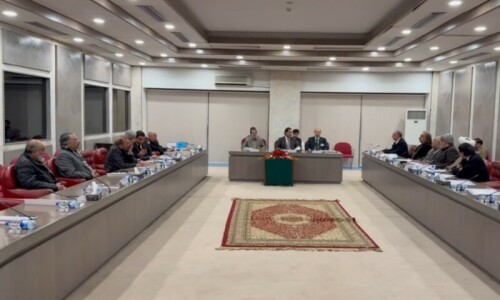It would be safe to bet that in the past week in Pakistan if – and whenever – you’ve turned on your TV set and tuned in to a news channel, you have been bombarded with visuals and soundbites of the 'revolution'.
Fifty channels in five languages have brought us Imran Khan and Tahirul Qadri live, daily, promising an urgently imminent ‘inqilab’ that would resolve all problems, from power outages to inflation, from accountability of rulers to fairer and more transparent elections.
These marathon live telecasts are not surprising, given that it’s been over a decade now that real-time private sector current affairs TV channels have been functional in Pakistan.
The wall to wall – or ball to ball, as Imran would say in his cricket jargon – coverage of two ‘long marches’ led by Imran and Qadri from Lahore to Islamabad is a manifestation of the competition for not just audiences but also the big bucks that come with larger chunks of consumers tuning in.
With opinion-laden, round-the-clock coverage led by a small army of 'analysts' crammed in gaudy studios, you would be forgiven for forgetting that there was anything else happening in or outside Pakistan that mattered.
The fight against Taliban getting fiercer, for instance.
Or the multiplying domestic refugees.
Or the spike in killings of policemen in Karachi that just crossed the 100 mark this year.
Or that India has broken off key talks with Pakistan.
In this intense focus on the ongoing public spectacle, has the media really been faithful to its calling in allocating a massively disproportionate emphasis on the political campaigns? What’s the template by which this is measured?
“The unspoken, unwritten, unsaid but understood contract between people and the media is that the latter will essentially be a guardian of the former’s interests. The deal is rooted in the fundamental rights to freedom of expression and access to information,” says Sheikh Waseem Ahmed, the president of Radio Broadcasters Association, the representative group of the country’s 120 private sector FM stations.
“It is also understood that being in the private sector, the media can make profits and market its consumers to its advertisers so that the money needed to run the information machine works to the advantage of all parties concerned - but while the media can be seen to be making efforts to increase its profits, it also needs to be seen making an effort to provide context and balance so public interests are not compromised,” Ahmed says.
So has the media done its job?
Lost in the estimated 10,000-40,000 revolution seekers getting unprecedented top billing on TV channels were events that, in another universe, would command their very own marathon live transmissions.
In which other country would the media all but blackout an ongoing war within national borders? A war with 100,000 soldiers pressed into service, generating 1,000 casualties – both soldiers and non-state militants – in a period of a few weeks. A war generating a staggering 800,000-1,000,000 internally displaced persons, with over 300,000 children missing schools and many of the refugees going hungry and diseased?
In short, a largely indefensibly exaggerated 24 hours a day, seven days a week live coverage of a handful of PTI and PAT agitators - but not even a puny 24 minutes of news in seven days for one million IDPs requiring mobilization of public opinion to pressurise the federal and provincial governments into attending to their needs.
“This is a strong argument for the media failing to attend to its primary function of being a guardian of public interest, by not focusing on facts on the ground and instead relishing in abstract speculation of likely political scenarios based on lesser defined aggrievement of some long marchers,” Ahmed says.
“The media coverage of the marches has revolved around the shortcoming of the electoral system and the perceived but hitherto unproven charges of election rigging,” says Zaigham Khan, the Executive Director of Civic Action Resources, an organisation that researches and analyses media content.
“Qadri may have hundreds of thousands of followers but his party is not an electoral stakeholder, so the disproportionately high media coverage of his demands on this subject seems unjust,” he says, adding: “Coverage of Imran’s grievance on this subject is more understandable, but considering that his party garnered only a little above 20% of the 2013 vote, the media is being dubious in granting him so much coverage while letting the views and narratives of 75% voters of other parties on the subject unrepresented.”
Senior journalist Iqbal Khattak, who has reported for some of the country’s leading media houses on politics and conflict, says the media thrives on sensationalism.
“This is true not just of Pakistan but all over. The trick is not overdoing it, and this is only possible if there are agreed rules [of media coverage],” he says. “Pakistani media has been losing credibility because editors and news editors are being forced to compromise on editorial policy under the influence of their marketing departments. This hurts ethics.”
Khattak points out that without stringent rules on how live news is to be managed, the practice of unending coverage of public events allows the personal feelings of protagonists like Imran and Qadri to distort political narratives, and compromise etiquette.
“For example before he led the crowds to the Red Zone, Imran in his speech used language reserved for private company not a public gathering," Khattak says.
"Unki shalwaray geeli ho gai hain he [Imran] said referring to parliamentarians opposing him. Imran is entitled to his views and language, but while he may have been at fault for not caring about cultural norms of decency dictated by the presence of women and children, how can the media escape blame for not having rules that would prevent such statements to air.”
The author is a media and political analyst and tweets at @adnanrehmat1














































